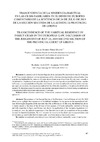Please use this identifier to cite or link to this item:
https://accedacris.ulpgc.es/jspui/handle/10553/73048
| Title: | Trascendencia de la residencia habitual en las crisis familiares en el Derecho europeo: comentario de la sentencia de 24 de julio de 2019 de la Sección Segunda de la Audiencia Provincial de Girona | Other Titles: | Transcendence of the habitual residence in family crisis in the European Law: Discussion of the judgement of July 24, 2019 Second Section of the Provincial Court of Girona | Authors: | Pérez Martín, Lucas Andrés | UNESCO Clasification: | 5603 Derecho internacional 590103 Política internacional 560508 Derecho privado 560202 Derecho comparado |
Keywords: | Divorcio contencioso internacional Residencia habitual Nacionalidad Ámbito de aplicación International contentious divorce, et al |
Issue Date: | 2020 | Publisher: | Universidad Carlos III | Journal: | Cuadernos de derecho transnacional | Abstract: | La sentencia de la Sección Segunda de la Audiencia Provincial de Girona de 24 de julio de 2019 nos permite destacar la trascendencia que en las relaciones internacionales entre privados tiene la residencia habitual de las partes en el momento en el que surge el conflicto. En este caso, la residencia habitual en España en el momento del divorcio de dos cónyuges de nacionalidad francesa, casados en Francia, y con propiedades en España y en Francia, provocó, en aplicación de la normativa europea que aquí analizaremos, la competencia judicial de los tribunales españoles, aplicando la legislación española. No dejaremos pasar la ocasión para exponer que argumentación y la terminología empleada en la resolución podrían hacer sido más exactas y correctas. The sentence of the Second Section of de Provincial Court of Girona of July 24, 2019 allows us to highlight the importance of the habitual residence for the parties in the international relations between private parties at the moment when the conflict arises. In this case, the habitual residence in Spain caused at the time of the divorce of two spouses of French nationality, married in France, and with properties in Spain and France, and due to the application of the European regulations will be analyzed here, the judicial competence of the Spanish courts and the completion of the procedure through the Spanish legislation. We will not miss the occasion to highlight that the argumentation and the terminology used in the final decision could have been more accurate and correct. |
URI: | https://accedacris.ulpgc.es/handle/10553/73048 | ISSN: | 1989-4570 | DOI: | 10.20318/cdt.2020.5212 | Source: | Cuadernos de Derecho Transnacional [EISSN 1989-4570], v. 12 (1), p. 657-672, (Enero 2020) | URL: | http://dialnet.unirioja.es/servlet/articulo?codigo=7279778 |
| Appears in Collections: | Artículos |
SCOPUSTM
Citations
2
checked on Jun 8, 2025
Page view(s)
87
checked on Jan 10, 2026
Download(s)
161
checked on Jan 10, 2026
Google ScholarTM
Check
Altmetric
Share
Export metadata
Items in accedaCRIS are protected by copyright, with all rights reserved, unless otherwise indicated.
